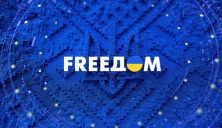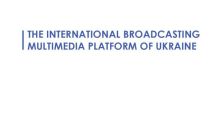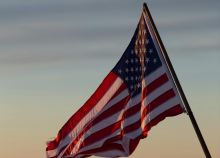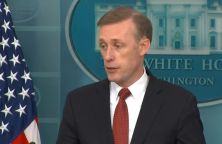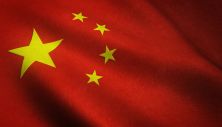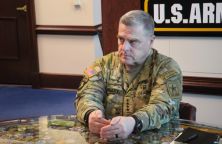By Peter Rough and Luke Coffey (FPRI) -- Russia’s large-scale invasion of Ukraine was a seismic event for the Republic of Moldova. The war...
Vous n'êtes pas connecté
- English
- Français
- عربي
- Español
- Deutsch
- Português
- русский язык
- Català
- Italiano
- Nederlands, Vlaams
- Norsk
- فارسی
- বাংলা
- اردو
- Azərbaycan dili
- Bahasa Indonesia
- Հայերեն
- Ελληνικά
- Bosanski jezik
- українська мова
- Íslenska
- Türkmen, Түркмен
- Türkçe
- Shqip
- Eesti keel
- magyar
- Қазақ тілі
- Kalaallisut ; kalaallit oqaasii
- Lietuvių kalba
- Latviešu valoda
- македонски јазик
- Монгол
- Bahasa Melayu ; بهاس ملايو
- ဗမာစာ
- Slovenščina
- тоҷикӣ ; toğikī ; تاجیکی
- ไทย
- O'zbek ; Ўзбек ; أۇزبېك
- Tiếng Việt
- ភាសាខ្មែរ
- རྫོང་ཁ
- Soomaaliga ; af Soomaali
Rubriques :
 Maroc - EURASIAREVIEW.COM - A la une - 15/Jun 01:49
Maroc - EURASIAREVIEW.COM - A la une - 15/Jun 01:49
How Do Ethnic Kazakhs Really Feel About The Fierce War Going On Between Russia And Ukraine? – Analysis
Russian President Vladimir Putin put forth ceasefire demands Friday, on the eve of the Summit on Peace in Ukraine, planned to be held in Bürgenstock Resort in Switzerland on 15-16 June 2024. He said that Russia would cease fire and enter peace talks if Ukraine dropped its NATO ambitions and withdrew its armed forces from four Ukrainian provinces claimed by Moscow. To be specific, his conditions, should their acceptance be the case, imply the full withdrawal of the Ukrainian Army from the entire territory of the Donetsk, Luhansk, Kherson, and Zaporizhzhia provinces in eastern and southern Ukraine. This seems more of a deliberate propaganda move than a search for real peace. “The conditions are very simple... As soon as they declare in Kyiv that they are ready for such a decision and begin a real withdrawal of militaries from these regions, and also officially announce the abandonment of their plans to join NATO - on our side, immediately, literally at the same minute, an order will follow to cease fire and begin negotiations”, Vladimir Putin said. “I repeat, we will do this immediately. Naturally, we will simultaneously guarantee the unhindered and safe withdrawal of Ukrainian units and formations”, he added. Ukraine slammed Putin’s peace conditions. The country’s foreign ministry described Putin’s plan as ‘manipulative’, ‘absurd’ and designed to ‘mislead the international community, undermine diplomatic efforts aimed at achieving a just peace, and split the unity of the world majority around the goals and principles of the UN Charter’. NATO and the United States on Friday also slammed Putin's Ukraine peace demands. Meanwhile, the Russian media seem to be delighted with them. The most popular headline of the topic seems to be as follows: “Putin: Donbas and Novorossiya are forever with Russia, this matter is closed”. Novorossiya is a historical name, which means New Russia, used during the era of the Russian Empire for an area that would later become the southern mainland of Ukraine: the region immediately north of the Black Sea and Crimea. Many people in Russia believe that Novorossiya should belong to Russia by historical right as the main cities there were founded by Russia: Kharkiv in 1656, Zaporizhzhia in 1770, Kryvyi Rih in 1775, Dnipro in 1776, Kherson in 1778, Mariupol in 1778, Luhansk in 1795. While listing these cities, the Russian authors wonder: what do they have to do with Ukraine! It may not seem like such an interpretation by Russians of their historical right to some territories in Ukraine has much to do with Kazakhstan and Kazakhs, but it does. The Russian-language net is full of publications, raising a similar issue in connection with Kazakhstan. Here is what Lenta.ru, in an article entitled “On their own land” said on the subject: “Disputes about how justified (from a historical point of view) the transfer of the northern regions of Kazakhstan to the Kazakh SSR, and then independent Kazakhstan, were, have been going on for decades. At the turn of the century, the project of these territories' seceding [from Kazakhstan] was even discussed”. All of this talk has been and is taking place at a fairly high level in Russia. Here are a couple of examples of it from the relatively recent past. Appearing on Russian state television in December 2020, Russian MP Vyacheslav Nikonov said: “Kazakhstan simply did not exist, northern Kazakhstan was not inhabited at all and today’s Kazakhstan is a great gift from Russia and the Soviet Union”. Then Evgeny Fyodorov, yet another State Duma deputy and a member of the Central Political Council of ruling United Russia party, more clearly articulated what is meant by ‘a great gift from Russia’. He called the titular ethnic group of Kazakhstan, the Kazakhs, ‘nitshebrody’ (‘vagrants and beggars’, ‘trash’, ‘homeless people who beg for alms’) who do not have the right to their own land. Literally, Evgeny Fyodorov said: “Take the Kazakh Constitution off from the territory of Kazakhstan and Kazakh laws from the territory of Kazakhstan!.. What I'm talking about now is a direct territorial claim. A direct, distinct territory claim”. Pyotr Tolstoy, the Deputy Speaker of Russia’s Parliament, just recently claimed publicly that Almaty is a Russian city. He, according to Anatoly Nesmiyan, “described the Kazakh statehood extremely contemptuously as ‘a certain Kazakh state”. Against such an information background, the Kazakhs seemingly should be greatly sympathetic to the Ukrainian cause given the current Russia-Ukraine war. Especially since President of Ukraine Volodymyr Zelensky during a recent meeting in Kharkiv with a group of journalists from Central Asian countries, namely from Kazakhstan, Kyrgyzstan, and Uzbekistan, according to the Turkish national television channel TRT and Eadaily.com, a Russian pro-Kremlin outlet, said that “Kazakhstan will be next after Ukraine”. However, the reality seems to be different. The above-mentioned interview of the Ukrainian President didn't draw widespread comment in the Kazakh media and society. And that begs the question: How do Kazakhs, who have considerable experience in dealing with both Russians and Ukrainians, really feel about the fact that there still is a fierce war going on between Russia and Ukraine? The question that is posed here, is not plain - neither is the answer. The thing is that many people from among the elderly and middle-aged Kazakh population in Kazakhstan have become used to not making the difference between Ukrainians and Russians. Such vision has been formed since the Soviet period, and it has remained almost unchanged until now. Back then, not only Russians, Ukrainians, and Belarusians, but also almost all Russian-speaking people of European (Caucasian) origin, were seen by the ethnic Kazakh population as Russians. And the Soviet Union was regarded by the non-European minorities in the country, including the Kazakhs, as being, in fact, a Russian-Ukrainian State with its center in Moscow. Such assertion itself may probably be considered as an insult to Ukrainians now, but at the time it made sense. In the post-Stalin years, three out of five supreme Soviet leaders were representatives of the Ukrainian republic or the Ukrainian ethnic group, Nikita Khrushchev, Leonid Brezhnev and Konstantin Chernenko, and the fourth, Mikhail Gorbachev, was half-Ukrainian, half-Russian. During the same period, one ethnic Ukrainian, Panteleimon Ponomarenko, and one native of Ukraine, Leonid Brezhnev, served as the first secretary of the Central Committee of the Communist Party of Kazakhstan. In the same years, just two people, thought to be ethnic Kazakhs, Dinmukhamed Kunaev and Nursultan Nazarbayev, were promoted by the Kremlin to this job, with the former having been serving as such for a total of 25 years and the latter taking the office shortly before the collapse of the Soviet Union. Here it is probably necessary to mention that there is no unanimity in Kazakhstan as to who Dinmukhamed Kunaev really was by ethnicity. Kazakh journalist Madat Akkozin, in his article entitled “Dinmukhamed Kunaev. How was his image was falsified during his lifetime” and published on the website of Radio Azattyq, quoted Ismail Yusupov, an ethnic Uigur who had headed the Central Committee of Communist Party of Kazakhstan in 1962-1964, as saying: “He [Dinmukhamed Kunaev] is of Tatar ethnicity. I as the former leader of Kazakhstan, state this with full responsibility. Nobody knows Kunaev and his parents better than I”. Abdukerim Ganiev, a Kazakhstani writer of Uigur origin, claims that, in fact, Dinmukhamed Kunaev was from among the [Volga] Tatars [who are an ethnic group belonging to the European race, native to the Volga-Ural region, Russia] and ‘he changed his ethnicity in the passport to facilitate for himself career’. Assuming that they and those who are of the same opinion are right, it follows that throughout nearly the entire post-Stalin period in the USSR, Moscow remained true to its practice of appointing solely representatives of European ethnicities originating in Russia, Ukraine and Belarus as the first secretary of the Central Committee of the Communist Party of Kazakhstan, a Union republic with the non-White indigenous population. The moment for a politician, whose Kazakh origin did not and does not cause questions, Nursultan Nazarbayev, to take this office came only in 1989, when four Union Soviet republics, Estonia, Lithuania, Latvia and Azerbaijan, had already declared their sovereignty and the others had been going to follow in their footsteps. In other words, by then the Kremlin was already experiencing difficulties in holding the reins of government in the Soviet Union, and that's probably why it had to make such a concession with regard to the question of who can be appointed to the top position in the Kazakh SSR. Before that, Moscow seemed to have a very little respect for the Kazakh public opinion and ethnic interests. It is sufficient to provide a single example to prove this. It is about the image of Soviet Kazakhstan in the eyes of a veteran US journalist, Llewellyn King. Here are his impressions of a time when Nursultan Nazarbayev took the helm of his republic: “When the Soviet Union collapsed in 1991, Nazarbayev moved from Soviet first secretary to being the first president of the Republic of Kazakhstan. The country was in horrible shape. Soviet Russia had used it as a place to do that which was unspeakable: throw people into Gulag prisons, conduct nuclear tests, and dump nuclear waste; and to launch space probes. The Soviet view was if it is dirty, dangerous or inhuman, do it in Kazakhstan”. Here probably one should just make a small explanation: all of what ‘is dirty, dangerous or inhuman’ was then being done in the very places that were inhabited mainly by ethnic Kazakhs. Moscow was cautious not to do this kind of thing in the districts of Kazakhstan, populated mostly by ethnic Russians and other Russian-speaking Europeans, such as Ukrainians, Germans and Belarusians. In the late 1980s, during a teleconference with Mikhail Gorbachev, one Russian woman from Kazakhstan asked him an open-ended question: “Why was it decided to destroy medium and short-range missiles in Sary-Ozek [it's about the Sary-Ozek polygon located in the Almaty province]? It is not only the Kazakhs who live near it. We Russians live there as well”. These all probably explain why the Kazakhs choose to be cautious and keep themselves somewhat detached from the Russian-Ukrainian conflict.
Articles similaires
FREEDOM in May: refuting myths about the “fatigue” of Ukraine’s partners and exposing war crimes of the Russian Federation
In May, the foreign Russian-speaking audience of the FREEDOM TV channel focused on exposing war crimes of the Russian army, the attitude of Russians...
Ukrainian international broadcasting in 2023: strengthening of the broadcasting network, growth of foreign viewership, new platforms, milestone premieres
In 2023, the state-owned enterprise IBMPU (FREEDOM, Dim, UATV English, UATV Arabic, UATV Español, The Gaze) expanded and strengthened its...
US will announce new military assistance package for Ukraine
The United States is expected to provide another military aid package to Ukraine This was reported by The Associated Press. "The U.S. is...
Rostov Prison Clash Highlights Growing Threat To Putin Regime – Analysis
Six Muslim prisoners in Russia seized a senior penal official and a guard on June 16 in the hopes of being released. At least three of the attackers...
North Korea’s Kim Hails Russia Alliance, Promises Putin Support On Ukraine
By Taejun Kang North Korean leader Kim Jong Un hailed a “new, high level of alliance” with Russia on Wednesday as he promised President...
US clarifies its position on strikes inside Russia with American weapons
National Security Advisor Jake Sullivan stated that the permission to use US-provided arms spans "anywhere that Russian forces are coming across the...
Russia And Vietnam: Reaffirmed Ties In Turbulent Times – OpEd
Putin’s visit to Hanoi comes as a result of several invitations by the host, and not because he was obliged to visit this historical ally, since...
China abstains from comments on Peace Summit in Switzerland
China does not consider it necessary to provide any comments on the peace conference in Switzerland and its conclusions as its representatives did...
It is clear Russians are not willing to negotiate peace now, – General Mark A. Milley
The Russian-Ukraine war may have reached its deadlock but it is not possible to start peace talks as Russians do not truly pursue the concept of...
Les derniers communiqués
-
Adobe Brings Conversational AI to Trillions of PDFs with the New AI Assistant in Reader and Acrobat
Adobe - 21/02/2024
-
Laura Frigenti takes the Helm as Chief Executive Officer of the Global Partnership for Education
Global Partnership for Education - 05/12/2022
